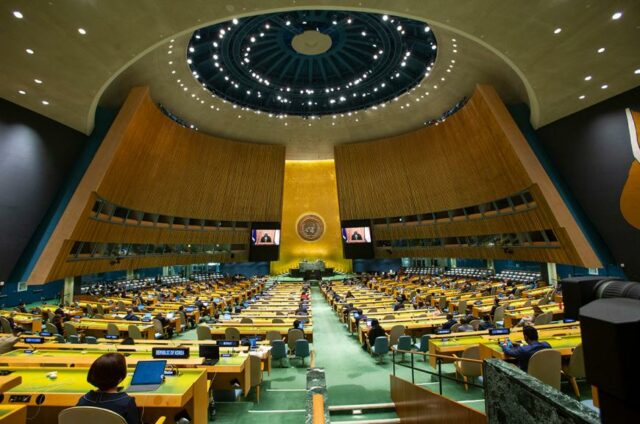UN: World Leaders Should Press China, Russia on Atrocities
16 September 2022


UN member countries address the 76th session of the United Nations General Assembly at UN headquarters in New York City, September 25, 2021. © 2021 Kena Betancur/Pool Photo via AP ©
(New York) – World leaders gathering at the United Nations General Assembly in New York City should commit to ensuring accountability for grave human rights violations by the Chinese and Russian governments and other major offenders, Human Rights Watch said. The UN General Assembly’s annual General Debate, attended by dozens of heads of state and government, will be held from September 20 to 26, 2022.
The General Debate is an important opportunity for world leaders to address the most urgent human rights issues, including following up on a UN report detailing possible crimes against humanity in the Xinjiang region of China; Russian atrocities in Ukraine; war crimes and crimes against humanity in Ethiopia, Myanmar, and Syria; and the blanket oppression of women and girls in Afghanistan. They should discuss plans of action for feeding the world’s hungry and tackling the devastating impacts of climate change.
“World leaders should use the UN General Assembly’s global stage to direct the spotlight on the countless crimes by Chinese and Russian authorities,” said Louis Charbonneau, UN director at Human Rights Watch. “Countries that seek to bring major powers to justice will open the door to addressing the broad range of human rights violations being committed around the globe.”
Due to the Covid-19 pandemic, the week of speeches in the General Assembly Hall will be the first since 2019 that will be almost entirely in person. Ukrainian President Volodymyr Zelensky, who is planning to speak via video, will be an exception.
US President Joe Biden and French President Emmanuel Macron are among those slated to speak. They should condemn grave abuses by allied governments as well as authoritarian adversaries and promote rights-respecting approaches to the economic crisis, such as universal social protection. They and other leaders should commit to ensuring accountability for grave international crimes regardless of where the crimes occurred.
African leaders should urge the African Union and the three African UN Security Council members – Ghana, Gabon, and Kenya – to drop their resistance to the Security Council adding the nearly two-year conflict in northern Ethiopia to its formal agenda. Security Council involvement is critical given the failure of AU mediation to end the atrocities and the humanitarian crisis in Ethiopia.
In addressing climate change, world leaders should highlight the urgency to mitigate and pre-empt its impacts, as evident by the recent devastating floods in Pakistan and Bangladesh that have affected millions of people. They should commit to prioritizing the well-being of older people, children, people with disabilities, and other marginalized and at-risk groups in rescue, relief, and rehabilitation processes related to extreme weather events. Leaders of countries historically most responsible for climate change, including top emitters in Europe and North America, should support vulnerable countries’ efforts to adapt to the growing toll of climate change.
Much of the activity during the General Assembly’s busiest week of the year takes place at side events and special meetings. The UN secretariat has an unnecessary and counterproductive practice of barring nongovernmental organizations from UN headquarters during the week. While there are exceptions for isolated events, the default exclusion of civil society groups prevents them from fully contributing during a key time in the UN calendar. UN member states should insist on including human rights and other groups in the week’s discussions and side events, Human Rights Watch said.
The issue of accountability for war crimes and other serious violations of international law will be discussed at a ministerial Security Council meeting, organized by France, the current council president, on ending impunity for war crimes in Ukraine. Denmark, the Netherlands, Ukraine, and Germany are organizing a meeting on the same topic for the majority of UN member countries. Meetings are also expected about accountability for sexual violence in armed conflict and on Myanmar’s persecution of ethnic Rohingya Muslims.
Delegations will also hold sessions on food security and hunger, already a global problem before the Covid-19 pandemic and the war in Ukraine. Discussions are expected on the Horn of Africa, Afghanistan, and conflict zones such as Yemen and Ethiopia, where there have been concerns that hunger has been used as a weapon of war. Delegations should discuss ways of addressing the underlying flaws in global food systems that lead to volatility and rising food prices.
The UN will host the Transforming Education Summit on September 19. World leaders should use the summit to call for an expansion of the right to education in international law, and to commit to recognizing a right of every child to at least one year of free preprimary education and to free secondary education.
“World leaders should kick off the next 12 months of the UN General Assembly with a call to action on human rights and accountability, ending hunger and poverty, and mitigating the effects climate change,” Charbonneau said. “These leaders should ensure that the outsize attention given the UN General Debate is deserved.”
Announcements
28 February 2025
Asian NGO Network on National Human Rights Institutions , CSO Working Group on Independent National Human Rights Institution (Burma/Myanmar)
Open letter: Removal of the membership of the dis-accredited Myanmar National Human Rights Commission from the Southeast Asia National Human Rights Institution Forum

Progressive Voice is a participatory rights-based policy research and advocacy organization rooted in civil society, that maintains strong networks and relationships with grassroots organizations and community-based organizations throughout Myanmar. It acts as a bridge to the international community and international policymakers by amplifying voices from the ground, and advocating for a rights-based policy narrative.